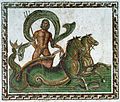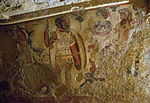legendary figures found in Etruscan mythology. The names below were taken mainly from Etruscan "picture bilinguals", which are Etruscan call-outs on art depicting... 42 KB (1,213 words) - 23:08, 14 December 2023 |
 | Italian religions such as the Etruscan religion were influenced by Greek religion and subsequently influenced much of the ancient Roman religion. "There... 58 KB (7,679 words) - 03:38, 21 April 2024 |
 | Haruspex (category Etruscan religion) hepatoscopy (also hepatomancy). The Roman concept is directly derived from Etruscan religion, as one of the three branches of the disciplina Etrusca. Such methods... 10 KB (1,142 words) - 19:49, 4 January 2024 |
 | and iconography for Latin literature and Roman art, as the Etruscans had. Etruscan religion was also a major influence, particularly on the practice of... 142 KB (19,091 words) - 12:12, 8 April 2024 |
 | Tinia (category Etruscan religion) Tin, Tinh, Tins or Tina) was the sky god and the highest deity in Etruscan religion, equivalent to the Roman Jupiter and the Greek Zeus. However, a primary... 5 KB (424 words) - 04:39, 19 April 2024 |
 | Laran (category Etruscan religion) In Etruscan mythology and religion, Laran (or Larun) is the god of war. In art, he was portrayed as a naked youth wearing a helmet, a cuirass and carrying... 5 KB (606 words) - 18:02, 12 March 2024 |
 | Uni (mythology) (category Etruscan religion) fertility, family, and women in Etruscan religion and myth, and was the patron goddess of Perugia. She is identified as the Etruscan equivalent of Juno in Roman... 19 KB (2,451 words) - 16:27, 3 October 2023 |
 | Neptune (mythology) (redirect from Neptune (Roman religion and mythology)) 145. Erika Simon "Gods in Harmony: The Etruscan Pantheon" in N. Thomas De Grummond (editor) Etruscan Religion 2006 p. 48; G. Colonna "Altari e sacelli:... 39 KB (4,778 words) - 17:26, 24 April 2024 |
 | Vulcan (mythology) (redirect from Vulcan (Roman religion and mythology)) fire and smithery. In Etruscan religion, he is identified with Sethlans. Vulcan belongs to the most ancient stage of Roman religion: Varro, the ancient... 41 KB (5,442 words) - 05:03, 30 January 2024 |
paganism Cantabrian religion Castro religion Dacian religion Eblaite religion Elamite religion Etruscan religion Gallaecian religion Georgian paganism Germanic... 75 KB (5,206 words) - 16:27, 22 April 2024 |
 | Dii Consentes (section Etruscan) Twelve. However, Etruscan artifacts show extensive use of Etruscan translations of Greek mythology; it is just as likely that both the Etruscan Twelve and the... 6 KB (581 words) - 08:40, 24 February 2024 |
 | Diana (mythology) (redirect from Diana (Roman religion)) personalities and actions developed later, under the influence of Greek and Etruscan religion. By the 3rd century BCE, Diana is found listed among the twelve major... 95 KB (12,890 words) - 20:08, 15 February 2024 |
 | Hercle (category Etruscan religion) In Etruscan religion, Hercle (also Heracle or Hercl), the son of Tinia and Uni, was a version of the Greek Heracles, depicted as a muscular figure often... 4 KB (391 words) - 05:45, 6 March 2024 |
Śuri (category Articles containing Etruscan-language text) and later adopted into ancient Roman religion. The theonym Śuri (Etruscan: 𐌉𐌛𐌖𐌑, romanized: Śuri, from Etruscan: 𐌛𐌖𐌑, romanized: Śur, lit. 'black')... 25 KB (1,996 words) - 18:39, 24 April 2024 |
 | Mercury (mythology) (redirect from Mercury (Roman religion)) the 4th century BC. His cult was introduced also by influence of Etruscan religion in which Turms had similar characteristics. From the beginning, Mercury... 18 KB (1,858 words) - 19:37, 19 January 2024 |
 | Mythology of Italy (section Etruscan mythology) The Etruscan city of Corythus as the "cradle" of Trojan and Italian civilization. The arrival of the Great Mother (Cybele) in Rome. Etruscan religion comprises... 19 KB (2,271 words) - 23:42, 2 April 2024 |
Sethlans (mythology) (category Etruscan religion) In Etruscan mythology, Sethlans was the god of fire, the forge, metalworking, and by extension craftsmanship in general, the equivalent, though their names... 1 KB (138 words) - 07:44, 4 September 2023 |
Dii involuti (category Etruscan religion) In Etruscan religion, the dii involuti ("veiled" or "hidden gods", also di involuti or dii superiores et involuti) were a group of gods, or possibly a... 3 KB (289 words) - 18:20, 2 March 2023 |
 | Catha (mythology) (category Articles containing Etruscan-language text) some of the characteristics of Catha when he was brought into the Etruscan religion. Giovanni Colonna has suggested that Catha is linked to the Greek... 8 KB (1,076 words) - 21:18, 26 November 2023 |
 | and probably arrived in Rome itself around 200 BC. Like all mystery religions of the ancient world, very little is known of their rites. They seem to... 17 KB (2,134 words) - 13:48, 24 April 2024 |
 | Aita (category Articles containing Etruscan-language text) Aita (Etruscan: 𐌀𐌕𐌉𐌀), also spelled Eita (Etruscan: 𐌀𐌕𐌉𐌄), is an epithet of the Etruscan chthonic fire god Śuri as god of the underworld, roughly... 6 KB (563 words) - 14:43, 5 April 2024 |





